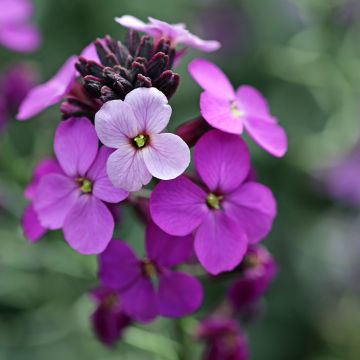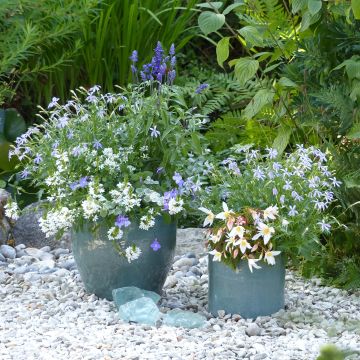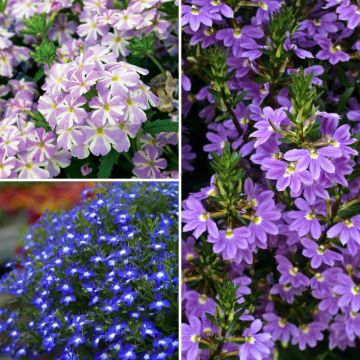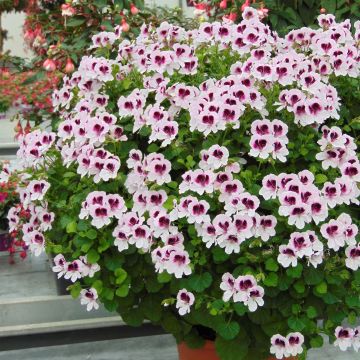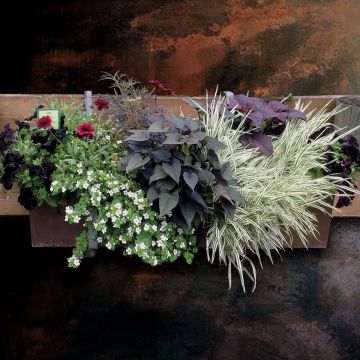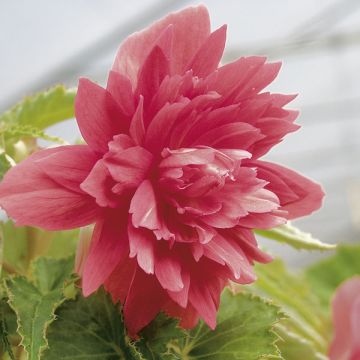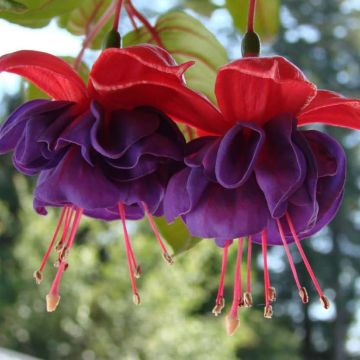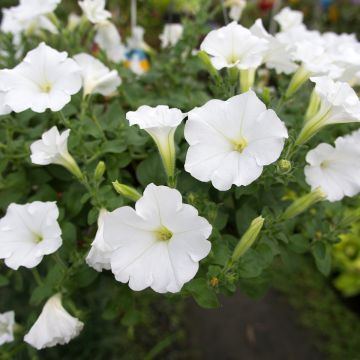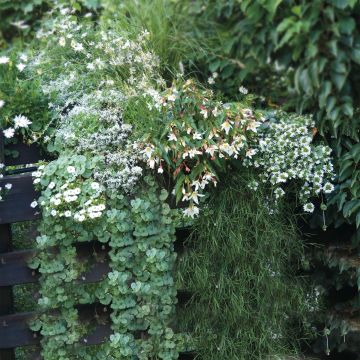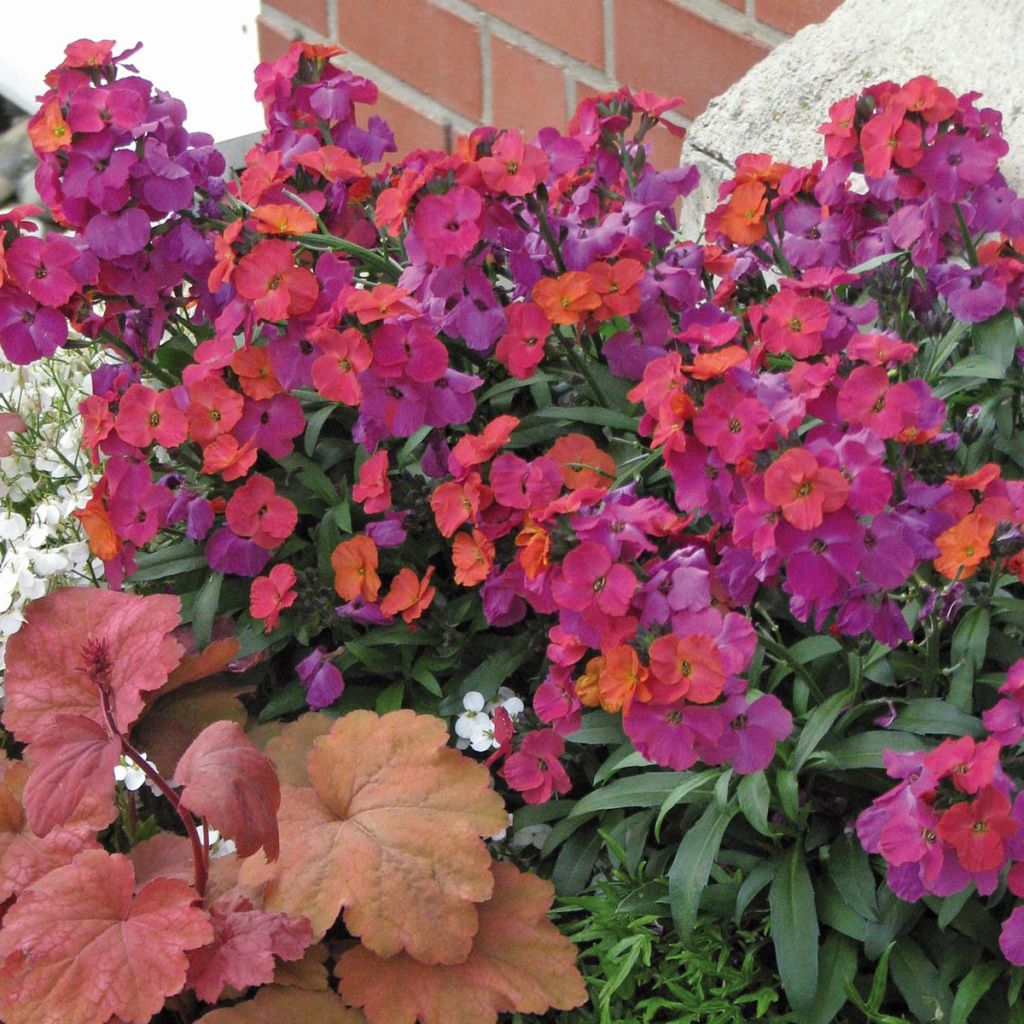

Giroflée vivace - Erysimum Winter Orchid
Erysimum Winter Orchid - Perennial Wallflower
Erysimum WINTER Orchid
Wallflower
This plant carries a 6 months recovery warranty
More information
We guarantee the quality of our plants for a full growing cycle, and will replace at our expense any plant that fails to recover under normal climatic and planting conditions.
From €5.90 for pickup delivery and €6.90 for home delivery
Express home delivery from €8.90.
From €5.90 for pickup delivery and €6.90 for home delivery
Express home delivery from €8.90.
Delivery to Corse prohibited: UE law prohibits the import of this plant from mainland France to Corse as part of the fight against Xylella fastidiosa. Please accept our sincere apologies.
More information

Does this plant fit my garden?
Set up your Plantfit profile →
Description
A pure marvel, you absolutely have to try this new variety of perennial wallflower, Erysimum 'Winter Orchid' whose big flowers have a unique and delightful colour -difficult to describe- orange, copper, ochre when blooming then pink, purple, purple... it's hard to choose! Passing through shades of raw sienna at the intermediate stage. All served by a powerful and healthy vegetation. Try it, you'll tell us all about it!
We are far, far from the somewhat "boring" vision of the bed of biennial flowers, pansies and multicoloured primroses, with daisies and tulips as a bonus. When you observe the Erysimum 'Winter Orchid', up close or from afar, it is a plant of exquisite refinement. Gathered in graduated spikes from orange to purple, on paper, what may seem garish is in fact served by the infinite subtlety of nuances and the "blending" effects between each one that these flowers will reveal to you. Oh, have you smelled it? That sweet fragrance, a little sweet, like the smell of gingerbread? It's still our perennial wallflower 'Winter Orchid'...
The shrubby wallflower 'Winter Orchid' is the result of patient hybridization work carried out by the breeder Silvia Hofmann in Germany, who strives to create new wallflowers with larger flowers, longer flowering periods, well-scented and showing bright and original colours. Branched from the base and with a dense and elegant foliage, these hybrids are perfectly suited for container gardening, which is not at all the case for dame's rocket wallflowers that self-seed in old gardens or on walls... Its aesthetic and agronomic qualities, therefore, must convince you that the perennial wallflower 'Winter Orchid' is ideal for embellishing your pots, containers, window boxes on your terrace or even a simple windowsill, and of course in your seasonal beds if you are lucky enough to have a garden!
How to associate it? Its graduated and nuanced colour allows you to attempt a whole range of colour combinations, including the most subtle ones. All shades of pink, apricot, copper, and orange naturally blend together. If you dare, a touch of dark red will be well absorbed and will "enhance" your combination, like a spice. Its early flowering, from March, and also very long, until at least June, calls for giving it a succession of companion plants: biennial flowers, early perennials, bulbs, in several varieties whose flowering will succeed each other in spring. Don't forget the unfailing foliage: Heucheras ('Georgia Peach', 'Caramel', 'Berry Smoothie'...) and many Carex (especially the bronze ones) will make a choice setting for it without stealing the show!
Note: Attention, our young plants in mini-pots are professional products reserved for experienced gardeners: upon receipt, replant them as soon as possible, in pots, containers, or directly in beds.
Report an error about the product description
Erysimum Winter Orchid - Perennial Wallflower in pictures
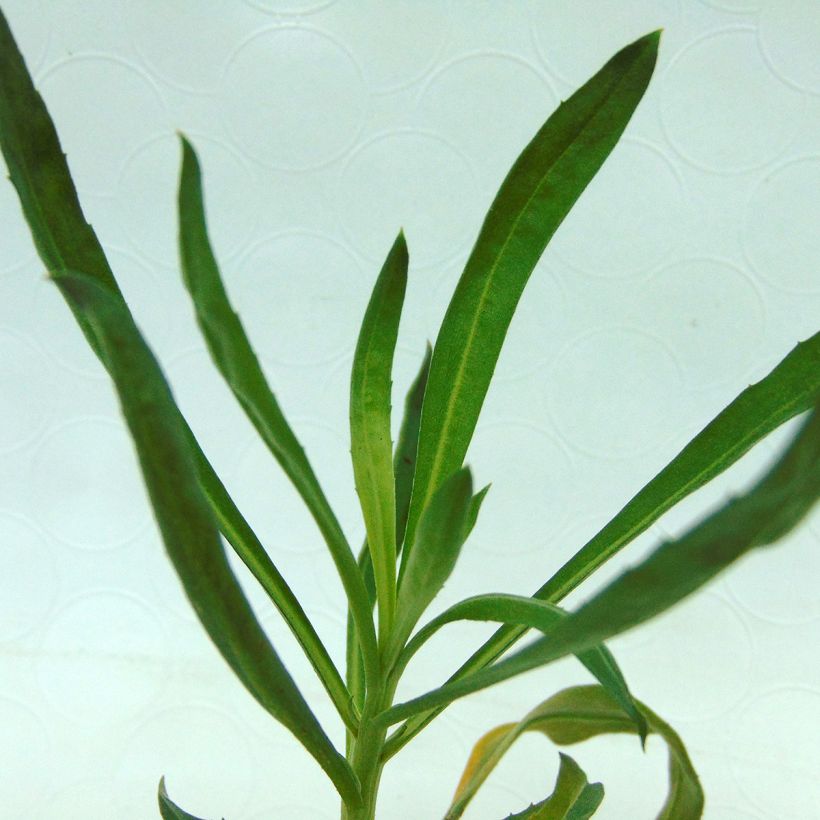

Flowering
Foliage
Plant habit
Botanical data
Erysimum
WINTER Orchid
Brassicaceae
Wallflower
Cultivar or hybrid
Other Wallflowers
Planting and care
The plug plants of Erysimum 'Winter Orchid' are planted in pots and containers or directly in open ground in a finely prepared and enriched soil.
How to grow it in pots? Plant it, with its companions, between mid-September and mid-October, in a beautiful container, pierced with drainage holes for water. Use a quality potting soil, a formula like "geraniums and flowering plants", enriched with slow-release fertilizer and, if possible, containing clay. It is a tall plant, with a bushy habit, which you will place at the back or in the center of the composition. Place your creation in full sun. At planting, or a few days later, pinch it to encourage branching. Water regularly but not excessively, even in winter if the weather is mild. It is a very demanding plant: you must absolutely provide it with liquid fertilizer with the watering water once a week, and even twice a week at the peak of flowering. Once again, a commercial formula for "geraniums and flowering plants" is necessary, with a good level of trace elements. Water very regularly, never let it dry out, as it could turn yellow and drop some of its foliage. If some flower spikes were to completely exhaust themselves, you can gently cut the dried spikes with scissors to maintain a neater appearance, but this is by no means obligatory, it will continue to flower as long as it has something to drink and eat!
How to grow it in the garden? When planting your summer annuals, don't throw away your perennial wallflower 'Winter Orchid'! It is indeed a hardy perennial, which will form an undershrub 40 to 50cm tall and just as wide. Its dark green elongated foliage persists all year round. Flowering begins from mid-March and continues generously until June or even throughout the summer in regions with cool summers. Since its parents come from mountainous regions, it requires a perfectly well-drained soil, even rocky, such as that of a rockery or a wall base sheltered from rain. It needs a sunny location, a good base fertilizer, and occasional watering in dry periods, that should be enough for its happiness for 3 to 5 years. After that, it should be renewed by taking cuttings in summer, as it is a short-lived perennial. One last piece of advice: every year, after flowering, and at the latest in early July - even if the flowering is not finished - cut back the Erysimum 'Winter Orchid' by 5 to 10cm (3.9in) in length. This will help it branch out, "renew" itself to prevent it from exhausting too quickly, and prolong its lifespan.
Planting period
Intended location
Care
-
, onOrder confirmed
Reply from on Promesse de fleurs
Plug plants - Annuals
Haven't found what you were looking for?
Hardiness is the lowest winter temperature a plant can endure without suffering serious damage or even dying. However, hardiness is affected by location (a sheltered area, such as a patio), protection (winter cover) and soil type (hardiness is improved by well-drained soil).

Photo Sharing Terms & Conditions
In order to encourage gardeners to interact and share their experiences, Promesse de fleurs offers various media enabling content to be uploaded onto its Site - in particular via the ‘Photo sharing’ module.
The User agrees to refrain from:
- Posting any content that is illegal, prejudicial, insulting, racist, inciteful to hatred, revisionist, contrary to public decency, that infringes on privacy or on the privacy rights of third parties, in particular the publicity rights of persons and goods, intellectual property rights, or the right to privacy.
- Submitting content on behalf of a third party;
- Impersonate the identity of a third party and/or publish any personal information about a third party;
In general, the User undertakes to refrain from any unethical behaviour.
All Content (in particular text, comments, files, images, photos, videos, creative works, etc.), which may be subject to property or intellectual property rights, image or other private rights, shall remain the property of the User, subject to the limited rights granted by the terms of the licence granted by Promesse de fleurs as stated below. Users are at liberty to publish or not to publish such Content on the Site, notably via the ‘Photo Sharing’ facility, and accept that this Content shall be made public and freely accessible, notably on the Internet.
Users further acknowledge, undertake to have ,and guarantee that they hold all necessary rights and permissions to publish such material on the Site, in particular with regard to the legislation in force pertaining to any privacy, property, intellectual property, image, or contractual rights, or rights of any other nature. By publishing such Content on the Site, Users acknowledge accepting full liability as publishers of the Content within the meaning of the law, and grant Promesse de fleurs, free of charge, an inclusive, worldwide licence for the said Content for the entire duration of its publication, including all reproduction, representation, up/downloading, displaying, performing, transmission, and storage rights.
Users also grant permission for their name to be linked to the Content and accept that this link may not always be made available.
By engaging in posting material, Users consent to their Content becoming automatically accessible on the Internet, in particular on other sites and/or blogs and/or web pages of the Promesse de fleurs site, including in particular social pages and the Promesse de fleurs catalogue.
Users may secure the removal of entrusted content free of charge by issuing a simple request via our contact form.
The flowering period indicated on our website applies to countries and regions located in USDA zone 8 (France, the United Kingdom, Ireland, the Netherlands, etc.)
It will vary according to where you live:
- In zones 9 to 10 (Italy, Spain, Greece, etc.), flowering will occur about 2 to 4 weeks earlier.
- In zones 6 to 7 (Germany, Poland, Slovenia, and lower mountainous regions), flowering will be delayed by 2 to 3 weeks.
- In zone 5 (Central Europe, Scandinavia), blooming will be delayed by 3 to 5 weeks.
In temperate climates, pruning of spring-flowering shrubs (forsythia, spireas, etc.) should be done just after flowering.
Pruning of summer-flowering shrubs (Indian Lilac, Perovskia, etc.) can be done in winter or spring.
In cold regions as well as with frost-sensitive plants, avoid pruning too early when severe frosts may still occur.
The planting period indicated on our website applies to countries and regions located in USDA zone 8 (France, United Kingdom, Ireland, Netherlands).
It will vary according to where you live:
- In Mediterranean zones (Marseille, Madrid, Milan, etc.), autumn and winter are the best planting periods.
- In continental zones (Strasbourg, Munich, Vienna, etc.), delay planting by 2 to 3 weeks in spring and bring it forward by 2 to 4 weeks in autumn.
- In mountainous regions (the Alps, Pyrenees, Carpathians, etc.), it is best to plant in late spring (May-June) or late summer (August-September).
The harvesting period indicated on our website applies to countries and regions in USDA zone 8 (France, England, Ireland, the Netherlands).
In colder areas (Scandinavia, Poland, Austria...) fruit and vegetable harvests are likely to be delayed by 3-4 weeks.
In warmer areas (Italy, Spain, Greece, etc.), harvesting will probably take place earlier, depending on weather conditions.
The sowing periods indicated on our website apply to countries and regions within USDA Zone 8 (France, UK, Ireland, Netherlands).
In colder areas (Scandinavia, Poland, Austria...), delay any outdoor sowing by 3-4 weeks, or sow under glass.
In warmer climes (Italy, Spain, Greece, etc.), bring outdoor sowing forward by a few weeks.

































